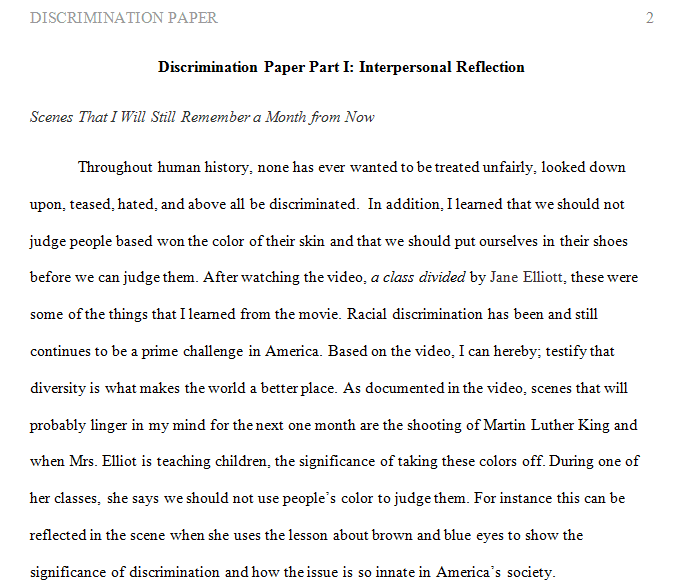What do you think actual discrimination might do
A Class Divided explores the nature of prejudice. Third grade teacher Jane Elliott deliberately created a classroom situation to teach her students how it feels to be on the receiving end of discrimination. This is an encore presentation of the classic documentary on third-grade teacher Jane Elliott’s “blue eyes/brown eyes” exercise, originally conducted in the days following the assassination of Rev. Martin Luther King Jr. in 1968. This classic classroom experiment, conducted in the late 1960s in a small Midwestern town, demonstrates how quickly and easily schoolchildren can internalize prejudice and discriminate. Years later, these children discuss the valuable lessons they learned from this experiment. Elliott employs this same teaching strategy with a group of adults in the workplace, and discusses their reactions.
This assignment is designed to allow you to synthesize what you have been learning about the various dimensions of diversity and the necessity of treating everyone in an inclusive, sensitive and respectful manner.
Discrimination Paper Part I: Interpersonal Reflection
After viewing the video, consider the following questions and write your response. Your response should be 4-5 pages and should address each question thoroughly, reflecting an accurate representation of what you have learned in this course. Demonstrate scholarship by utilizing supporting resources to justify your ideas and responses:
What did you learn from the film? What scene or scenes do you think you’ll still remember a month from now and why those scenes?
Did any part of the film surprise you? Do you think someone with a disability, of a different sexual orientation, an older American or some of a different religion would also find it surprising? Why or why not?
Both Elliott and her former students talk about whether this exercise should be done with all children. What do you think? If the exercise could be harmful to children, as Elliott suggests, what do you think actual discrimination might do? Use an example, different from the example you used to describe labels, from what you have learned about people with disabilities, older people, sexual minorities, or people of differing religions.
How can negative and positive labels placed on a group become self-fulfilling prophecies? Use an example from what you have learned about people with disabilities, older people, sexual minorities, or people of differing religions.
Based on what you have learned in this course, discuss an example (either from the video or from your experiences) that illustrates each of the following statements:
Dimensions of diversity may be hidden or visible.
Dimensions of diversity are in a constant state of flux.
Dimensions of diversity are not always clear-cut or easily defined.
Discrimination Paper Part II: Personal Interview
For Part II of this assignment, you will have a conversation with someone who you feel may have faced discrimination. Examples include someone with a disability, an older American, someone who is a sexual minority, or someone who lives in a multicultural family. After choosing an individual to interview, explain to this individual what you have seen in the Class Divided program. Invite them to watch the program, or parts of the program, with you. After watching or discussing the program, pose the following questions to the individual. Be sure to explain the reason for your questions and why you have selected them to participate in the interview:
What, if any, discrimination do you experience?
How have you coped with this situation?
What do you think needs to change at the cultural level to reduce discrimination?
Solution preview for the order on what do you think actual discrimination might do
APA
1788 words
